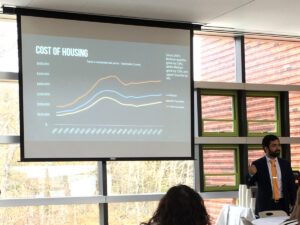Where’s the work? It’s here on Cape Cod!
The Second Annual Career Innovation Day, organized by the Cape Cod Technology Council in collaboration with the Cape Cod Community College and the Cape Cod Regional STEM Network, began with a speaker panel at Cape Cod Community College. We heard from the Cape Cod Commission about the reported exodus of young professionals, and from Convention Data Services and SencorpWhite about STEM jobs available on the Cape (and how to get them).
Are young professionals leaving the Cape?
 Mahesh Ramachadran, Economist for the Cape Cod Commission, started the morning off by questioning reports that young professionals are exiting the Cape.
Mahesh Ramachadran, Economist for the Cape Cod Commission, started the morning off by questioning reports that young professionals are exiting the Cape.
It’s been in the newspaper for the last 10 years. School enrollment is down. Reports show that the Cape is losing population, raising concerns about the labor force, funding allocation, infrastructure, and community character.
Mahesh, however, finds no evidence that 15,000 residents between 25-44 left. So how did we conclude loss of youth? The census data is not tracking people as they age, Mahesh said. Seventy and over decreased and 15 to 29 year olds also decreased. Why the drop in 15-29 year olds? There was a bubble of births on the cape in the ’80s and ’90s. When they grew up and went off to college in the 2000s they were not included on the census here. According to Mahesh, 7,614 Cape residents age 15-34 enrolled in college or graduate school in the 2000s.
There have been reports that our year-round labor force is collapsing, which Mahesh also disputes with data. If 15,000 25-44 year olds left the Cape it would be a 14% loss in labor force, which we did not see. Instead, 93,599 people were employed in 2014, up from 70,000 in 1990.
While the numbers seem to be good, the growth in labor force is slowing. We are not attracting as many young workers to the Cape as we were.
The average wage on Cape Cod is a concern, but not the real problem. It is our housing market that fails to serve the needs of every life stage, life style, and income group. We have a monoculture of single family housing. 85% of our housing stock is single family, and only 13% of our year round housing stock is available to rent (versus 31% nationally). We have 50% of all seasonal homes in the entire state. There are only 6 counties in the country with over 20% seasonal homes. Of those, we have the smallest square miles and highest density. (If you like rabbit holes of data, statscapecod.org will keep you busy.)
The high number of seasonal homeowners increases seasonal demand for services and labor, while reducing year-round rentals and year-round labor. The cost of housing is increasing by 18% for bottom quartile, which affects young professionals. We have large homes and it’s only getting worse. Furthermore, the median home is growing – 2300 acres of tree cover lost in 2001-2011 – fundamentally changing our environment.
The economic engine of Cape Cod is our environment, and the increased number of homes and climate change are changing it. We are a little piece of land in the ocean, with 13,000 single family homes in coastal hazard areas. The cost of relocating is immense. It’s not just a coastal issue, Mahesh said, it’s a regional issue.
We have pollution, traffic congestion, a less resilient economy, and too few place to live. To alleviate these issues Mahesh says we should build density away from the coast, with more housing for more people, especially in the $50-75k household income bracket. Higher density requires less infrastructure while maintaining our traditional villages and protecting the environment.
Growth in population and a year round economy on the Cape is limited by supply of housing for all life stages, life styles and all income groups, and we need to consider environmental impact.
Pursuing technical careers on Cape Cod
John “JD” Hawley, Chief Technology Officer of Convention Data Services (CDS), talked to us about some of the tech jobs available.
According to their website, Convention Data Services is the trusted registration and lead capture partner for driving global event connections for businesses and associations worldwide. Headquartered in Bourne, Massachusetts, CDS has built multi-faceted solutions to engage attendees, deliver exhibitor ROI and provide actionable analytics for the events industry since 1986.
There are tech jobs on the Cape, JD said, but hiring managers have a hard time finding qualified people. At CDS they hire trainable people rather than holding out for the perfect fit. One of their big criteria is proximity, and being a nice human being. They widen the scope when hiring – something JD recommends job seekers do too.
Entry level IT positions at CDS include tech retail, help desk/call center, quality assurance (it’s not all automated), desktop support, software support, entry level programming – html, css, javascript, sql, coding for science (Matlab, etc.).
Tip: Don’t be picky about what you are coding. JD says applicants need technical elasticity. They need to pick up applications and programming quickly, and jump from one programming language to another.
What hiring managers are looking for, in order:
1. Motivation, energy, enthusiasm
2. Demonstrated interest and passion in the field. (Gaming doesn’t count. It can be a good skill to have, but it’s not a qualification for a tech job.) If you started building websites when you were 8, that’s passion.
3. Work ethic – be conscientious, come to work on time, etc
4. Intellect and ability to learn. If your GPA is low, you need a reason. Some people are obviously smart, but struggle in school because of life circumstances.
5. Personality and communication skills
6. Skills
7. Experience
One of JD’s new-hires graduated last may from the IT program at Cape Cod Community College. She posted her resume on Indeed, was called in to interview, and was offered two positions. JD said she had a great phone interview, demonstrating all the things in the list above. She had also done a lot on her own. In addition to her Associates Degree, she was pursuing her A+ Certification. She wasn’t working in the field, but she was still making use of her knowledge of technology. He said she was interesting to talk to, had figured out a lot on her own, and had technical elasticity.
How to get there
JD said the first step is a really good one page resume that’s clean and memorable. It should demonstrate all of the above,
have a reasonable tailored objective, include a couple of references, and provide samples of writing, coding, etc.
The next step is to research target companies. Use Google and make use of your career center. Network and set up informational interviews. People at companies are happy to talk and answer questions. If JD talks to someone and they sound good on the phone, he may think of that person when he is hiring. Don’t ask for a job, just ask for information.
Follow up with an email, call, or visit. It’s okay to check in and make sure your resume went to the right person. Two or three follow ups are fine.
Post and search Indeed, Craigslist, and other job boards.
Don’t be picky, he said. It’s just a start. Once you get in the door with the right company work hard, be smart, and get promoted or leverage your experience for next job. Remember that you are not overqualified for the job you are hired for. Pitch in and have a great attitude.
Finally, get educated and get involved. Advance your education online or at continuing ed, pursuing training and certifications. Do things on your own – set up a home network, build a website, code a mobile app. Volunteer, tutor, help out friends and neighbors. If you go to school for programming but haven’t applied it in your own life, that doesn’t show passion or motivation in your field.
Almost every business uses technology. JD said if you’re tech-minded almost any job can turn into a tech job. Be open to possibilities. You never know where your career is going to go.
Manufacturing on the Cape
Keith Morrison, Vice President of Operations, SencorpWhite, wrapped up the speaker panel with information on tech jobs in manufacturing. He said most people don’t realize there is manufacturing on the Cape, but they are always looking for skilled people and provide 185 jobs locally.
SencorpWhite hires engineers, accountants, project managers, production control, purchasing, supply chain, sales, field service, CNC machinists, electrical assemblers, and mechanical assemblers. Half the battle, Keith said, is finding someone who wants to do a good job.
SencorpWhite is a full vertical manufacturing facility with a global customer base. There’s a welding area, machine shop, and painting shop, as well as training rooms, large machine assembly areas, and a clean assembly area for medical pouch and tray sealers. They have thermoformers, inline sealers, and custom machines. There is a big slice of skill sets within the company.
“The germans are very good at fostering apprenticeships,” Keith said. “All of us should think about that. Starting from the ground floor up is so important. That’s what we’re trying to do, helping our community to grow young professionals.”
